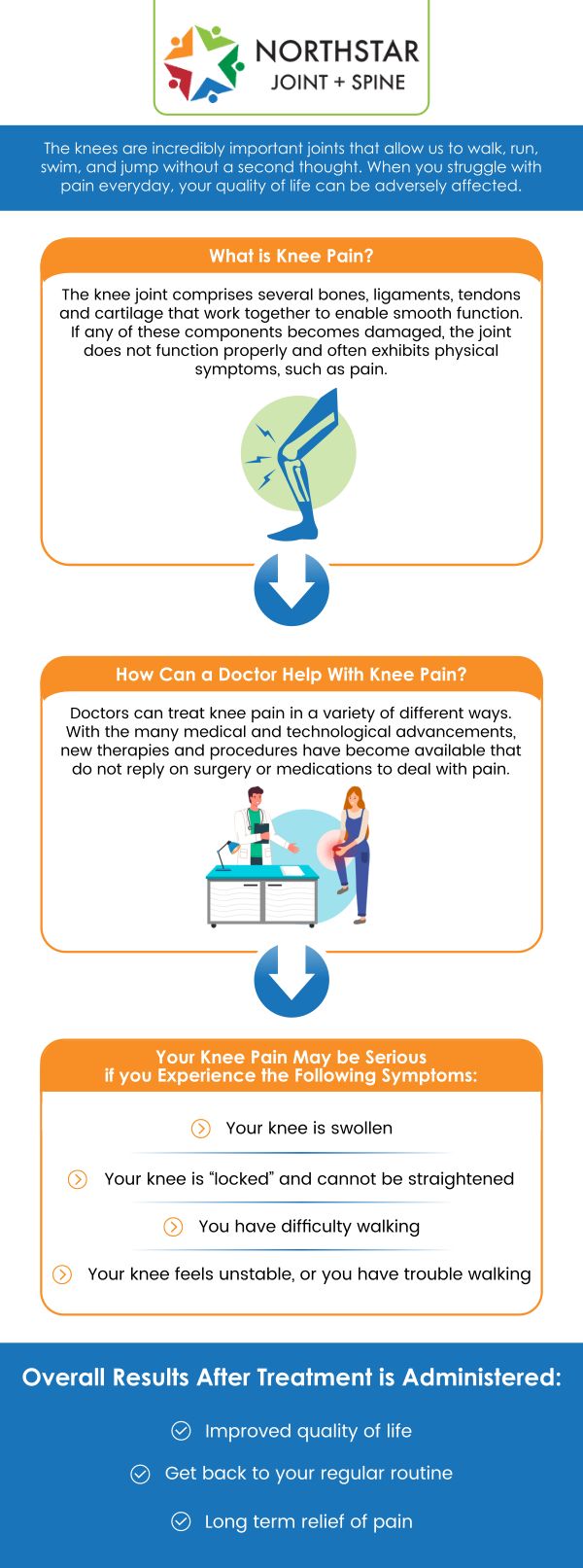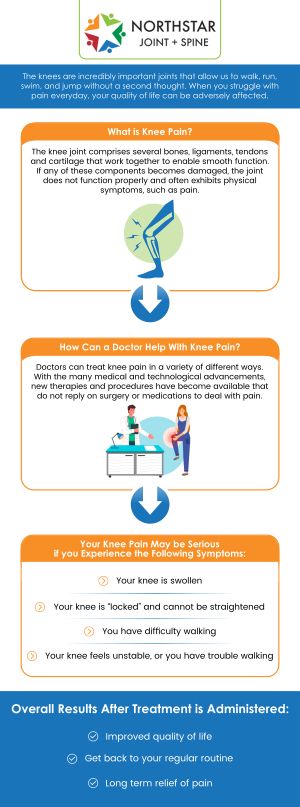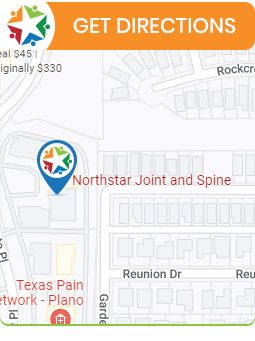What Causes Chronic Knee Pain?
Chronic knee pain can be caused by conditions like osteoarthritis, where cartilage breaks down, and tendonitis, which is inflammation of the tendons. Overuse of the knee joint can also lead to inflammation and pain. These issues often worsen without proper care. It’s important to address chronic knee pain early for effective management. Board Certified Dr. Robert J. Nocerini, MD, at Northstar Joint and Spine, specializes in diagnosing the root cause of knee pain and providing effective treatment options to help restore mobility and alleviate discomfort. For more information, contact us today or book a consultation today. We are conveniently located at 7704 San Jacinto Pl Suite #200 Plano, TX 75024.




Table of Contents:
What is chronic knee pain?
What causes chronic knee pain?
What diseases can cause knee pain?
How do I know if my knee pain is serious?
What Causes Chronic Knee Pain? Dr. Robert Nocerini’s Targeted Care in Plano, TX
We use our knees consistently throughout the day and rely heavily on their proper functioning to get us everywhere that we need to go and to perform our daily tasks. Chronic knee pain can quickly become not only a large source of discomfort but also a major inconvenience. While there are many different causes and levels of knee pain, as soon as the pain is affecting your life, having the pain managed and treated will ensure your continued high quality of life.
Chronic knee pain is a pain that lasts for longer than 3 months and differs in symptoms for every patient. Many patients will experience some swelling or sensitivity in one or often both knees that vary in intensity. The symptoms that are experienced are also heavily influenced by the cause of the knee pain, and what kind of daily activities the patient does that may affect how frequently the knees are used. There are many different possible causes as we use our knees for almost everything in our day-to-day lives, but thankfully, there are also many different treatments so that patients will not have to suffer from the pain.
Chronic knee pain can develop without any clear cause. One of the most common causes is osteoarthritis, a condition where the cartilage in the knee joint gradually wears down due to aging or repetitive stress. This breakdown leads to pain, stiffness, and reduced mobility. Another common cause is rheumatoid arthritis, an autoimmune condition where the body’s immune system attacks the joints, causing inflammation and damage to the knee over time.
Tendinitis is another common cause, particularly in individuals who engage in repetitive activities that strain the knee tendons, such as running or cycling. Overuse can lead to inflammation, resulting in ongoing discomfort. Bursitis, an inflammation of the fluid-filled sacs around the knee, often develops due to repetitive movements or prolonged pressure on the knee, causing persistent pain and swelling.
Conditions like gout, where uric acid crystals build up in the joints, and a meniscus tear, which affects the cartilage in the knee, can also contribute to long-term knee pain. These conditions often worsen without treatment, making it important to seek appropriate care to manage and alleviate the pain.
The most common disease that causes chronic knee pain is arthritis, including osteoarthritis, rheumatoid arthritis, gout (a type of arthritis caused by a build-up of uric acid crystals in the joint), pseudogout (arthritis caused by calcium-containing crystals that most commonly build up in the knee joint), and septic arthritis (an infection in the joint leading to cartilage degeneration). There are also multiple types of cancers that start or spread to the bones, which could lead to chronic knee pain. Baker’s (popliteal) cyst is another common condition that can cause chronic knee pain and often develops as a result of an underlying condition such as arthritis. It is a lump that forms in the back of the knee due to fluid build-up and swelling that causes an uncomfortable tightness and lack of mobility in the knee. For most of these diseases or conditions, treatment of the cause itself can often lead to alleviation of the knee pain as a result.
Knee pain can be uncomfortable and disruptive, especially since we rely on our knees for daily activities. It can be challenging to determine whether your knee pain is serious, but there are a few signs that can help guide your decision. If the pain is so severe that you cannot bear weight on the knee or feel like it might give out, this could indicate a more serious issue. Significant swelling, inability to fully bend or straighten the knee, or any visible deformity in the knee or leg should also prompt a visit to a healthcare provider.
Additionally, if you notice a fever accompanied by redness, warmth, or swelling around the knee, these could be signs of an infection or other serious condition. If the knee pain is not improving or is worsening over time, it is a good idea to seek medical advice. A healthcare professional can assess your symptoms and determine the best course of action to relieve pain and address any underlying issues.
There is no need to suffer from chronic knee pain anymore, Dr. Robert Nocerini MD, and his highly skilled team at NorthStar Joint and Spine are ready to help you get back to living your best life.
Chronic knee pain can make walking, climbing stairs, or exercising difficult. At Northstar Joint and Spine in Plano, TX, Board-Certified Dr. Robert Nocerini draws from 26 years of experience to identify the exact source of discomfort. He performs a thorough clinical evaluation and diagnostic testing to uncover whether pain stems from joint wear, inflammation, or strain.
Dr. Nocerini’s approach focuses on restoring natural movement and comfort. Each treatment plan is designed to strengthen the joint, improve flexibility, and minimize inflammation. His patient-first method ensures every Plano patient receives personalized care built for long-term results. For more information, contact us today or book a consultation today. We are conveniently located at 7704 San Jacinto Pl Suite #200 Plano, TX 75024. We serve patients from Plano TX, Willow Bend TX, Frisco TX, Allen TX, Addison TX, North Dallas TX, and surrounding areas.

Check Out Our 5 Star Reviews


Additional Services You May Need
▸ Back Pain
▸ Shoulder Pain
▸ Chronic Pain
▸ Epidural Steroid Injections
▸ Spinal Cord Stimulation
▸ Viscosupplementation
▸ Genicular Nerve Blocks
▸ Facet Injections
▸ Joint Injections
▸ Sacroiliac Joint Injections
▸ Lumbar and Cervical
▸ Facet Medial Branch Blocks
▸ Diagnostic Nerve Blocks
▸ Medication Management
▸ Neck Pain Doctor
▸ Diabetic Peripheral Neuropathy
▸ Headaches
▸ Suboxone
▸ Botox for Migraines
▸ Peripheral Nerve Stimulation
▸ Spine
▸ Joints
▸ Muscles
▸ Bones

Additional Services You May Need
▸ Back Pain
▸ Shoulder Pain
▸ Chronic Pain
▸ Epidural Steroid Injections
▸ Spinal Cord Stimulation
▸ Viscosupplementation
▸ Genicular Nerve Blocks
▸ Facet Injections
▸ Joint Injections
▸ Sacroiliac Joint Injections
▸ Lumbar and Cervical
▸ Facet Medial Branch Blocks
▸ Diagnostic Nerve Blocks
▸ Medication Management
▸ Neck Pain Doctor
▸ Diabetic Peripheral Neuropathy
▸ Headaches
▸ Suboxone
▸ Botox for Migraines
▸ Peripheral Nerve Stimulation
▸ Spine
▸ Joints
▸ Muscles
▸ Bones






